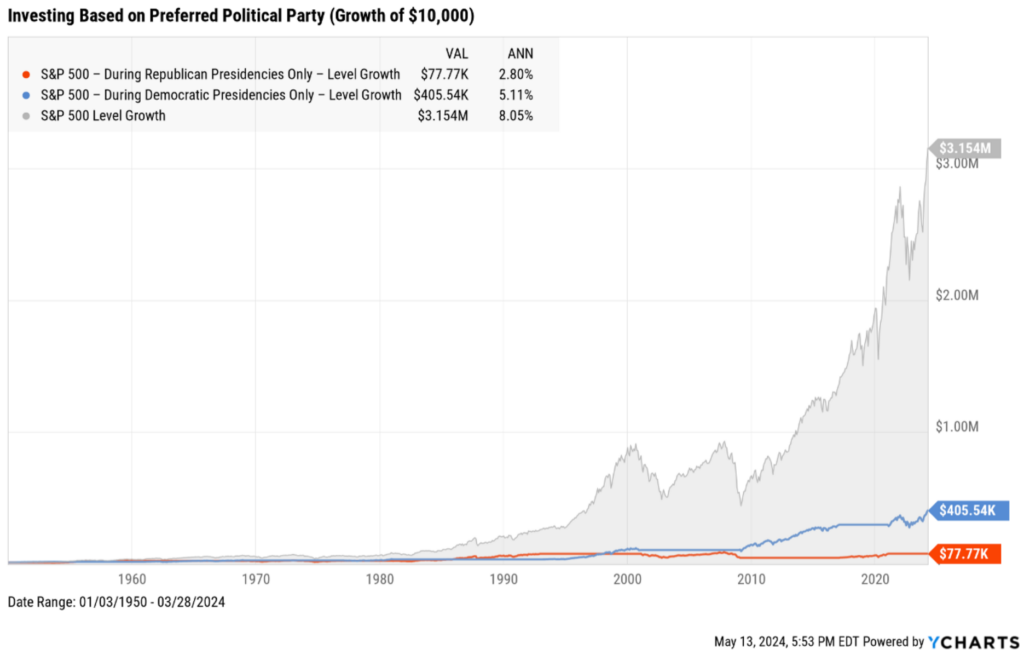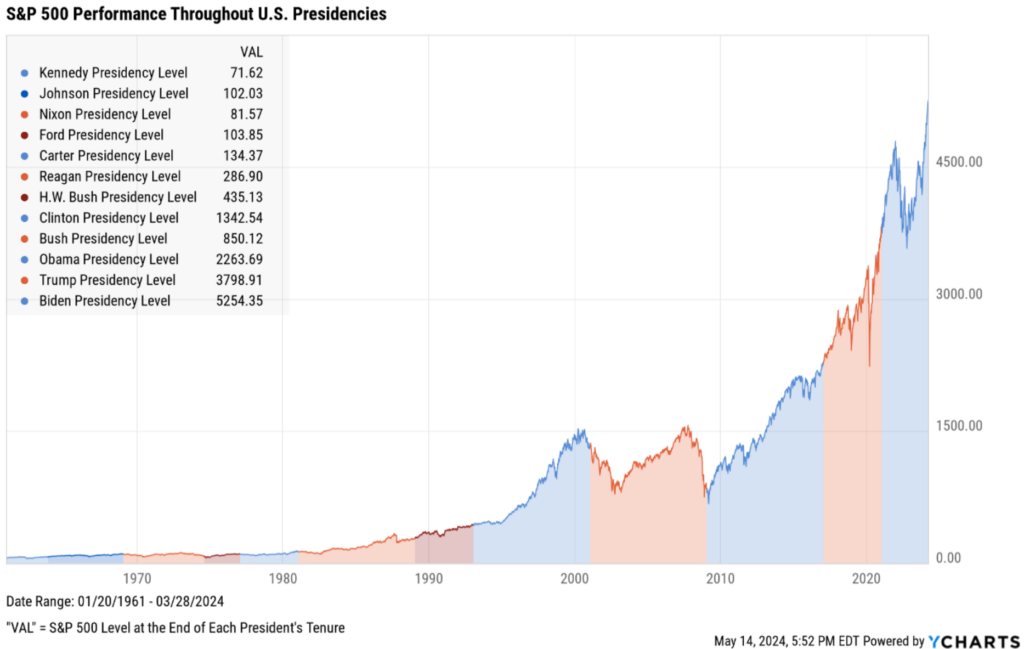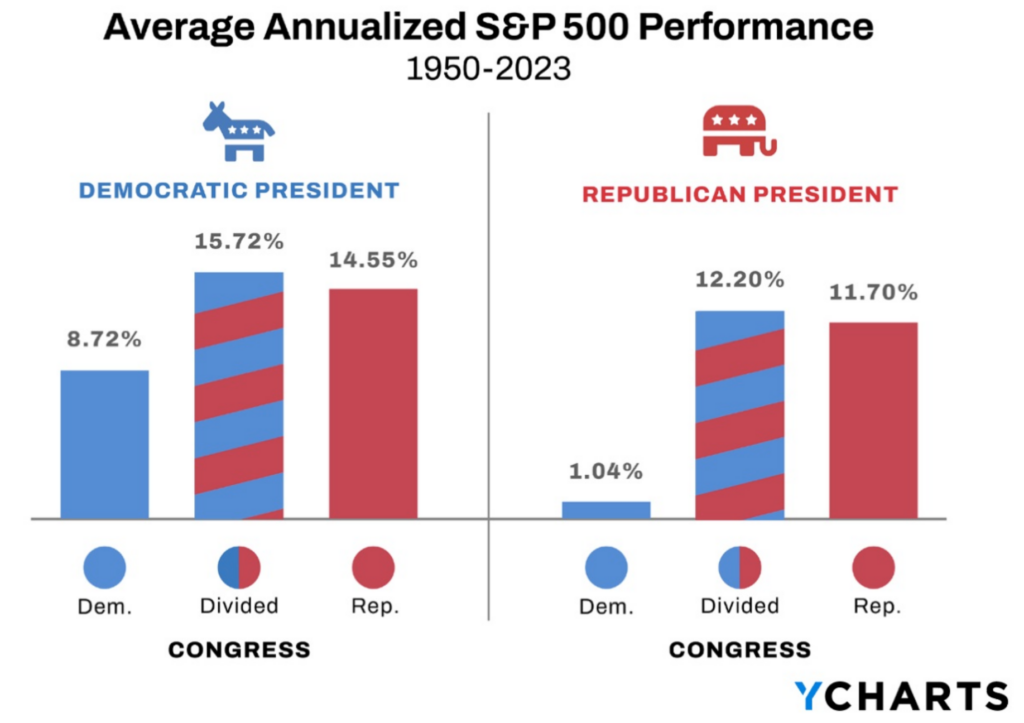Let me ask you a question: How’s the economy?
Interestingly enough, your answer might depend on who you voted for. It turns out we’re somewhat predictable animals in a number of ways. In our last blog post, we gave a politically neutral evaluation of the prior Trump administration’s economic policy and forecast what we might anticipate in the coming administration. Now that we’re two weeks past the election, we’re thinking about how you think about economics based on how you voted, and how that might color your view of things in the four years to come.
The Bias of Political Priors
Based on your answer to the question up top, I can guess how you voted in the election. If you said that the economy was bad leading up to the election, you probably voted Republican, and if you said the economy was good leading up to the election, you probably voted Democrat. But was the economy good or bad going into the election? Well, let’s consider a few benchmarks:
- Unemployment was at 4.1%.
- Wage growth over the prior 12 months was 3.99%.
- Inflation was sitting at 2.5% in the 12 months prior to the election.
- 30-year mortgage rates were around 6.72%.
- GDP had grown by 4.94% in the 12 months prior to the election.
You can feel that any of these are good or bad. Speaking objectively, relative to historic performance, the unemployment, wage growth, inflation, and GDP figures are good. The mortgage rate has been tough in comparison to recent history (e.g., the past decade) but pretty normal for long-term rates. Mind you, I don’t highlight those figures to say your feelings about the economy going into the election were right or wrong but to establish a baseline. Because what happens next is also going to be a curious phenomenon.
What Happens Next
Much as we can probably guess how you voted based on your feelings about the economy, I can also probably guess how you’re going to feel about the economy for the next four years based on how you voted. “If you voted Republican, watch as your feelings about the economy improve dramatically over the next year or so, if it even takes that long. Suddenly the 4.1% unemployment rate will be rather exciting, because it’s full employment! Wage growth greater than inflation will be wonderful. Inflation? That’s over with, inflation barely exists anymore. GDP? Never been better.” The only complaint you might have is if you’re looking to buy or refinance your home, at which time you might frown at persistently “high” rates.
What if you voted Democrat? Watch as your feelings about the economy begin to sour over the next year or so. “Unemployment at 4.1%? Well yeah, but people who’ve been unemployed for too long aren’t counted in that, there’s way more unemployed people. Wage growth greater than inflation? Sure, but it’s still miles behind inflation over the past several decades. Inflation is low? It was low before this administration, so who cares? GDP? Well sure it’s up, but it’ll probably tank any day now. After all, don’t you know we’re probably already in a recession?”
At least, no matter how you vote, you can both probably agree to frown about mortgage rates.
What is happening?
Despite our personal feelings that we’re intelligent, objective, and not so easily influenced, it turns out we’re always being influenced. It’s often subtle. The news sources we read start using cheery or glum language to describe the same events. Victories are overplayed or downplayed. Losses are downplayed or overstated. Whether it’s the economy, foreign policy, or domestic policy, notice how your news source becomes either elated or dour going forward. Think about how your conversations at the dinner table or out with friends sound. Are we the ones speaking enthusiastically about current events? Or are you talking about the impending doom awaiting us all?
The fact of the matter is that the United States has a strong economy today and always has. Recessions and depressions happen. Bear markets strike the stock market all the time. For every bad quarter, there are two good quarters. In the aggregate long-term view, things are generally always on the upswing if you zoom out far enough. But, in the short term, we’re only human. We’re easily influenced, and despite our best efforts, we consume an enormous volume of positive or negative content on a daily basis. With that in mind, let me share a few helpful charts from our market research platform. As you peruse, consider this: Are things really more or great or terrible than they were before? How has your opinion changed over the past few weeks? Will you feel the same way one, two, three, or four years from now, if everything is relatively the same?
Data for the Data Nerds – How’s the Economy?

Don’t invest solely based on who is in office.

It doesn’t matter now, it didn’t matter then.

Much as you might want to win across the board, it turns out it’s better to be split.
